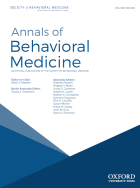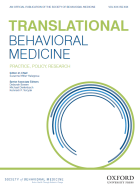
Summer 2019
An Interview with Outlook's New Editor, Crystal Lumpkins, PhD
 The Publication & Communication Council is excited to welcome Crystal Lumpkins, PhD, as our new editor of Outlook. Welcome Crystal, and congratulations on your inaugural issue!
The Publication & Communication Council is excited to welcome Crystal Lumpkins, PhD, as our new editor of Outlook. Welcome Crystal, and congratulations on your inaugural issue!
Getting into the Mix: Resources for Mixed Methods Research Training
Health science researchers are increasingly incorporating qualitative data with quantitative data, and giving much needed context and multi-level perspectives to complex health phenomena. Mixed methods research seeks to combine the worlds of quantitative data and qualitative data, integrating rather than simply appending these unique forms of data to one another.
Aiming High: A Profile of SBM Member and U.S. Public Health Service Captain Christine Hunter, PhD
 Perhaps you have wondered about the professional path that has led some of our colleagues to prominent positions at the National Institutes of Health (NIH). Maybe you noticed some SBM members in uniform, and wondered about the role of behavioral medicine in the military. Learn about these topics and more in this interview with Dr. Hunter.
Perhaps you have wondered about the professional path that has led some of our colleagues to prominent positions at the National Institutes of Health (NIH). Maybe you noticed some SBM members in uniform, and wondered about the role of behavioral medicine in the military. Learn about these topics and more in this interview with Dr. Hunter.
Funding Your Health Equity Research in an Evolving Era: Trends and Tips from National Funding Organizations
Health equity-focused efforts have evolved in recent years. To reflect on this evolving era, we asked leaders from two national funding organizations for their insights about health equity research trends, grant application tips, and more.
What’s New with the ETCD Council? An Interview with ETCD Chair Amy Huebschmann, MD
 Welcome to the summer 2019 “ETCD Council corner” of Outlook. In each issue of Outlook, look to the Education, Training, and Career Development (ETCD) Council corner for information related to our mission. The council aims to provide SBM members with opportunities and support to enhance their training and career development throughout all phases of their careers in behavioral medicine.
Welcome to the summer 2019 “ETCD Council corner” of Outlook. In each issue of Outlook, look to the Education, Training, and Career Development (ETCD) Council corner for information related to our mission. The council aims to provide SBM members with opportunities and support to enhance their training and career development throughout all phases of their careers in behavioral medicine.
In this issue, we interview ETCD Chair Amy Huebschmann as she enters her last year in this post.
SBM's Leadership Institute is Turning 5!
The Society of Behavioral Medicine’s Leadership Institute is turning 5! The institute will proudly celebrate its fifth anniversary at the 41st SBM Annual Meeting & Scientific Sessions in San Francisco, CA, April 1-4, 2020.
Mindful Aging: A Pathway toward Improved Health and Quality of Life
As the United States’ aging population continues to grow, enhancing quality of life in this patient cohort has become an area of emphasis. New avenues are being used to explore innovative and effective ways of improving older adults’ physical and mental health outcomes, one of which is mindfulness, or “paying attention in a particular way; on purpose, in the present moment, and nonjudgmentally.”
Physical Activity SIG Member Spotlight: Dr. Melicia Whitt-Glover, Gramercy Research Group
 We recently interviewed physical activity expert, Dr. Whitt-Glover, about her research and how she founded her own research group.
We recently interviewed physical activity expert, Dr. Whitt-Glover, about her research and how she founded her own research group.
Multimorbidity: Perspectives from the DoD and VA
SBM members are not strangers to the prevalence and costs associated with multimorbidity (i.e., co-occurrence of two or more disorders). In this article, members of the Military and Veteran’s Health SIG review some of the basic research on multimorbidity and issue a call to service for all researchers who may have the opportunity to work with Department of Defense (DoD) and Veterans Administration (VA) to improve the lives of our Servicewomen/Servicemen and Veterans who live with multimorbidity.
Our Path to Establishing a Line of Yoga Research for People with Disabilities: A Conversation with Drs. Arlene Schmid and Marieke Van Puymbroeck
Drs. Schmid and Puymbroeck have collaborated for over a decade on the use of yoga as a therapeutic intervention to improve function and wellbeing in individuals with neurological conditions. We ask them how their research has evolved and what advice they would give early career professionals interested in complementary and integrative medicine.
Preparing Students for Careers after Graduation: The Value of Community-Academic Partnerships
In the era of 200 character tweets and 10 second attention spans, university-level teaching has met new challenges. It is no longer only the job of an educator to relay information to students, but it has become their job to captivate their students' attentions with practical, innovative teaching methodologies that prepare them for careers after graduation. Community-academic partnerships offer a potential solution.
How to Participate in Type 1 Diabetes Research: An Introduction to the T1D Exchange Registry
More than 1 million people have type 1 diabetes in the United States, and less than a third of those diagnosed meet target blood glucose management goals. The T1D Exchange Registry is an innovative research study that seeks to improve the lives of people with type 1 diabetes by driving meaningful treatment, care, and policy, all through harnessing real-world data from the type 1 diabetes community.
Innovative Formats to Deliver Behavioral Interventions in Primary Care
A number of evidence-based behavioral interventions for a variety of concerns that significantly impact health, such as insomnia, are suitable for primary care. However, implementation of these interventions lags behind. We review several formats that provide opportunities for clinicians as well as researchers for translation of behavioral treatments.
New Articles from Annals of Behavioral Medicine and Translational Behavioral Medicine
SBM's two journals, Annals of Behavioral Medicine and Translational Behavioral Medicine: Practice, Policy, Research (TBM), continuously publish online articles, many of which become available before issues are printed. The following articles were recently published online in Annals or TBM.
Honors and Awards
Congratulations to the following SBM members who recently received awards or were otherwise honored. To have your honor or award featured in the next issue of Outlook, please email aschmidt@sbm.org.
Members in the News
The following SBM members and their research were recently featured in journals, news articles, or videos. To have your news spot featured in the next issue of Outlook, please email aschmidt@sbm.org.
President's Message: Provocative Questions in Behavioral Medicine
Over the past months, we have laid the ground work for assessing the future of behavioral medicine. Now we would like to engage you, our members, in a visioning exercise to contribute to that assessment.

Upcoming Events:
41st Annual Meeting & Scientific Sessions
April 1-4, 2020
San Francisco, CA












